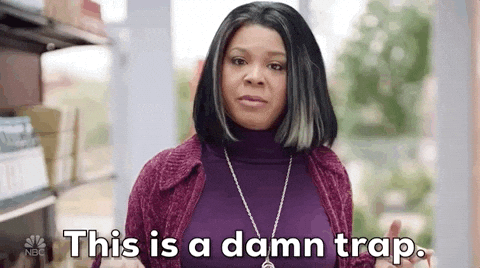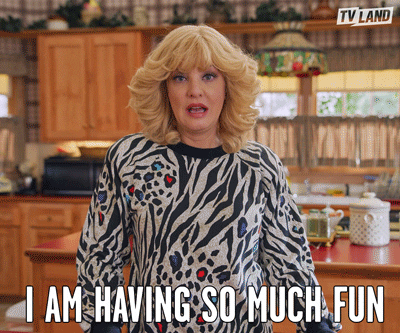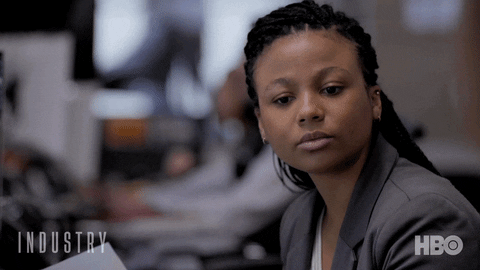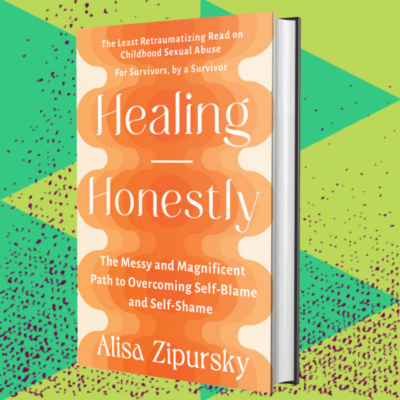To watch or not to watch, that is the question.
With so many docuseries about sexual violence, true crime podcasts, and tv shows that depict sexual abuse, we are constantly having to make decisions of whether we consume the content or not.
This may seem simple to people who don’t live with trauma. But this shit is complicated for those of us who have triggers that can take us out for days at a time. It can often feel like it’s a lose-lose situation: we feel badly that we can’t tolerate watching something, and we feel bad when we watch it and feel triggered and feel like we should’ve “known better.” Damned if we do, damned if we don’t!

I am going to do us all a favor and put the ending of this right here in the beginning. Spoiler alert: the answer is that we each have to do whatever is best for us, and our answers may be different from day to day or hour by hour, and that’s totally normal and cool too. What’s important is that we make the best decisions for ourselves with the limited information we have and, no matter what, we do not blame ourselves for the impact of living with trauma.
What we mean when we say “trauma triggers”
Let’s first discuss what actually is a trauma trigger.
[Aside: I lament how much the term “trigger” is overused, deployed to mock progressives, and has ultimately lost all functional meaning within popular culture. *sighs heavily with a deep and knowing exhaustion*]
A trauma trigger is something we experience in a sensory way that involuntarily sets off a series of reactions within us that cause us to relive the most traumatic moments of our lives. We do not get to choose what triggers us and we don’t get to decide how our body involuntarily responds to the trigger.
Experiencing a trigger is a full sympathetic nervous system response that includes every part of our minds and bodies. When I say “trigger” I do not mean having hurt feelings. I do not mean being overly sensitive. I do not mean being sad. I would just say those things if that’s what I meant. A trigger is not an emotional response, but rather a physical and nervous system response.
We should not feel self-blame or shame over having triggers or how our nervous systems react to them.
A trauma trigger is not about remembering, it’s about reliving our abuse
Trauma triggers are not about remembering our abuse. They are about reliving our abuse. Remembering abuse is more of a cognitive experience where we are aware that we are thinking about and considering the memories of what happened to us. Triggers, on the other hand, don’t really live in our minds like that as much as they live in our subconscious and in our bodies. We may be totally unaware that we are experiencing a trigger, only to notice that our bodies are doing things that indicate that we are reliving it.

Oftentimes our bodies know we are triggered before our minds do, and our bodies start re-enacting however they acted during moments of our abuse. Sometimes that looks like freezing, heart racing, nausea, shortness of breath, sharp pains, excessive sweating, a need to urgently run or remove our body from an environment, an intense impulse to hide, the sudden onset of intrusive thoughts, or the sudden onset of intense feelings of shame.
Triggers show up differently for each of us but, in case it’s helpful, I wanted to describe what it’s like for me when I’m triggered:
When I am triggered I often first notice it because I become lightheaded and my head feels like it’s spinning, my lips are chapped from short rapid breaths, and there is a nauseous feeling deep in my gut. I notice that my hands don’t really feel like my hands and I often am outside of my body looking down on myself, which is a coping mechanism known as dissociation.
Some important things to understand about trauma triggers:
- Our triggers can change and evolve alongside us. Something that may be triggering for us in the past is no longer, and vice versa.
- Triggers are deeply personal and specific to each of us. For example, I have really specific triggers around certain specific classic rock music and the taste of certain foods. I doubt hearing the specific song that sends me into a full trauma response has the same reaction for you.
- At the same time, there are also things that may be common triggers for many of us. For example, during the hearing for Supreme Court justice Brett Kavanaugh (vomit), I know many of us found that experience deeply retraumatizing. But I also find reading about Jeffrey Epstein super triggering, and I bet that is true for a lot of you too.
- But the gist is our triggers are NOT a reflection of our own healing, in that it’s totally normal to experience some triggers for the rest of our lives. Our responses to those triggers and our relationship to tem and our understanding of them are likely to change, but they are a natural part of living with trauma.
Sometimes triggering content helps us understand something important about our own abuse
Sometimes we watch content that we know is causing our trauma to resurface and that feels helpful and important to us. We may not be able to articulate exactly why we are watching something, but there is something inside that says it’s what we need.
I had a friend who used to watch the same triggering movie over and over again whenever he felt like he needed to access the hard emotions about his abuse, as the movie gave him space to cry and grieve.
I had another friend who was very consuming every news article, podcast, and documentary about Jeffery Epstein. She couldn’t pinpoint why she was, just that it felt important for where she was in healing from her CSA, and that she felt it was helping her better understand what she was experiencing. When she shared this information with me in a confessional way, and she had braced for me to tell her she was absolutely bananas or tell her she must stop.
I asked her, “Do you feel like this is important for you and your healing, even if you don’t know why?” And she said, “Yeah, that’s exactly what it feels like.” I told her that she’s the expert in her own safety and healing (just like you, dear reader, are for yours!) and if this is what she needs then great, I fully support it.
Both these examples illustrate that there are many good reasons to watch triggering content, like to learn something, to feel community and recognition, or to have an outlet for big feelings. If this is what you’re experiencing and you feel internally compelled to consume content directly related to your trauma, I encourage you to let go of having to pinpoint the why and instead practice radical acceptance that, for whatever reason, your inner healing guide is telling you what you need at this moment.
I did follow up and ask her, “When will you know it’s enough? What are the internal signs that you are ready to put this all down, and stop intensely consuming information about Jeffrey Epstein?” She said that she was going to continue to check-in with herself to make sure each day this is still what she felt like she needed, and as soon as it felt otherwise she’d put it all down. I thought that was an amazing idea.
…and also totally healthy and normal to avoid experiencing trauma triggers!
Often, we cannot avoid trauma triggers. We may not even know something was a trigger for us, so we obviously can’t avoid it. We may know something is a trigger but we are real people who live in the real world and all its restrictions and may not be empowered to avoid it.
For example, I used to be a server at a restaurant that played so much music that triggered my CSA, but I couldn’t walk off the job or leave the restaurant for the 3-minute song duration. My nervous system dealt with it by numbing out and/or disassociating, and then at the end of the shift I’d go home and try to do things to help myself get back in my body, like taking a cold shower.
But when there are times we know shit is likely to trigger it and we can safely avoid it and we want to avoid it, go ahead and avoid it!

We are real life people with responsibilities, people who rely on us, and things we need to get done in a day. We may truly not be able to afford the impacts that a trigger may have on us, especially if it requires us to be at home for several days resting and caring for ourselves.
Even those of us who work in this field, and perhaps especially those of us who work in this field, do not consume all the content out there about sexual abuse. People sometimes find this surprising! Friends and family will ask me about a current event of whatever high-profile person is being exposed as abusive or ask me what I thought about the docuseries exposing Harvey Weinstein or Diddy.
Sometimes I feel like I’m supposed to be able to watch all that shit. It’s what people expect from me, and therefore, I think it’s what I should expect from myself. This used to cause me shame and I feared I couldn’t be in the sexual violence prevention and healing field if I couldn’t handle this kind of content.
If I watched that shit all the time I wouldn’t be able to stay in this field and keep doing this job! I’d be floored by triggers and unable to get out of bed! I need my Real Housewives, my Golden Girls, and my celebrity gossip podcasts to keep me balanced and regulated.
You don’t have to keep up with all that shit, whether it’s fictional or in the news, to have something meaningful to say about CSA and living with trauma. Only consume it if it’s what you need. And if, mid-watching, you think it’s cool but it feels off, you can change your mind and turn it off or walk away! You’re the captain!
Whenever I say this on a mic in a room of other professionals in this field I usually get a ton of responses from people saying how relieved they are to hear me say it. I think it’s important we give ourselves and each other permission slips to, within the confines of our own lives and jobs, determine and take action on whatever is best for our healing.
Sometimes we don’t get it right with our triggers and that’s normal and okay!
The other day I was watching the season 3 finale of Industry, a show I have loved since it first premiered on HBO a few years ago. Throughout season 3 there were clear signs that it was leading up to the character Yasmin revealing that she was sexually abused by her father. I knew watching that reveal in the finale would likely fuck me up. But also, I had invested so many hours in these characters and cared about them deeply and didn’t want to not know what happened and how they address it.
While watching, I felt all the signs in my body that I was on the edge of a full-blown trauma trigger. I was nauseous, my breathing was shallow, I felt the pounding of an oncoming migraine. But I kept watching. Once the episode was over, I told Charlie, who didn’t watch the show, what had just happened and I felt embarrassed. I felt like I should’ve known better and fast-forwarded. I felt like a little kid who had knowingly broken a rule and touched a hot stove, even though they knew what would happen, and now was looking for sympathy about it. He, of course, was very compassionate, but I was judging myself.

We make calculations, sometimes in split seconds, with the incomplete information we have available to us, and sometimes it doesn’t turn out great. We can try to glean lessons from those experiences and learn more about our trigger patterns to help guide ourselves in the future. But triggers are also an inevitable part of living with trauma, so this shit is going to happen.
I think the most important question we can reflect on is: How can we practice radical self-compassion when that happens? How can we meet that moment with deep love and understanding for ourselves?
In the past I would’ve spent the entire night post-Industry finale beating myself up, both feeling the enormous weight of the trigger and then additional crushing layers of self-blame and shame for experiencing it. Instead, I acknowledged what happened, I took my xanax, I got in the shower, and I practiced honoring my needs. I recovered more quickly than I would’ve in the past.
What do we do about potentially retraumatizing content?
So what do we do? My advice is to find strategies for checking in with yourself when things are in your control and you can decide. Recognize that only you can know what’s best for your healing and wellbeing, what we need can change all the time, and sometimes we don’t know what’s best until we have some trial and error. With all that said…
Can you give yourself permission to explore content that feels important to you and your healing?
If yes, what are some safety measures you can put in place to care for yourself?
Here are some ideas I have:
- Be clear about the signs your body gives you that you are triggered and dysregulated
- Have a plan for decompressing after watching the show/movie/etc. Is there someone you are going to process it with? Are you going to journal? Are you going to do something that connects you back to your body?
Can you give yourself permission to avoid content that doesn’t feel right for you and your healing?
If yes, what are some steps you can take to support yourself in that decision?
Here are some ideas I have:
- Do something nourishing and loving for yourself since advocating for our own healing is really hard and important work. It’s worthy of celebration!
- Remember that strength doesn’t come from powering through triggering content to prove a point to anyone, it comes from being your own advocate and honoring your healing needs.
Remember, the problem isn’t us, it’s just that living with trauma is really tricky!
We began this story talking about the trap where we can feel that we are damned if we watch, damned if we don’t watch. We feel shame for avoiding triggers, we feel shame for experiencing triggers, we feel shame no matter what! It’s almost like we live in a society designed to make us feel like our trauma and the inevitable symptoms that come from complex-PTSD are our own faults! Whaddaya know?!

I know those voices of self-blame and shame can be so loud. But as best as you can, please remember it is not our fault that we live with the lasting impact of abuse we never should’ve had to endure. I see you and I honor that you are doing your absolute best to care for yourself while navigating the unavoidable messiness of trauma. You keep making the decisions you feel are best for you with each moment and when you feel lost I invite you to stop, turn inward and fill yourself with an abundance of self-compassion.

